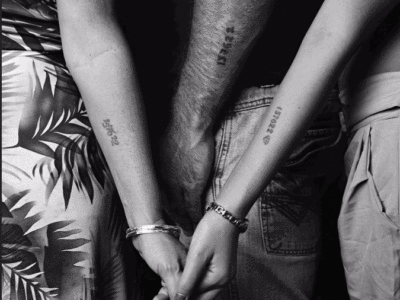The concept of getting a tattoo is to memorialize a loved one is nothing new. In modern society, the practice has become pretty standardized and is almost expected. A new take on the idea has stirred up some serious controversy, however, as more and more relatives of Holocaust survivors are opting to get their concentration camp identification numbers tattooed.
Recently, the controversy surrounding the topic has ignited after an article published in The New York Times on Sept. 30 shed light on it.
The process of tattooing as a form of identification was only utilized at Auschwitz and Auschwitz II (Birkenau), in fall of 1941 and March of 1942, respectively, according to The New York Times. The Auschwitz complex tattooed people’s chest for a short period of time, however more commonly the practice was employed on the left arm.
Although the tattooing process was a form of dehumanization, initially only prisoners who the Nazis determined were worthy of being kept for work were branded. In some ways, the tattoos provided prisoners with a sense of optimism and strength. By the spring of 1943, the Nazis took to tattooing almost all new and previously registered prisoners, greatly increasing the number of brandings. Having a low number was a source of respect, because it represented a prisoner who had survived multiple years in the camp, according to The New York Times.
While many concentration camp survivors removed their tattoos or hid them, others opted to embrace their identification numbers and test them in the lottery or voluntarily use them for identification purposes, according to The New York Times.
As the number of Holocaust survivors dwindles with each passing year, the stories and first-hand accounts are diminishing as well. In attempt to keep the memories alive, some relatives of Holocaust survivors are deciding to tattoo their relative’s numbers on their arms. The practice is controversial for many reasons, one being the Torah forbids tattooing. Leviticus 19:28 states: “Ye shall not make any cuttings in your flesh for the dead, nor imprint any marks upon you: I am the LORD”, according to www.Torah-online.org.
A new Israeli documentary by Dana Doron called “Numbered,” set to premiere at the Chicago International Film Festival this month, tells the story of two people who tattooed their father’s and grandfather’s numbers. Those who choose to tattoo the identification numbers do so as a way of living out the motto “never forget." They like the idea that the tattoo will provoke conversation, and see it as a way of forcing people to remember the stories of the Holocaust. Some who opted to get the tattoo did so because they believe each generation is becoming more and more removed from the realities of the Holocaust, such as Eli Sagir, 21, according to The New York Times.

According to a study conducted by the Pew Research Center, approximately 36 percent of 18-25-year-olds have a tattoo. Even in modern society however, where tattooing has become a socially acceptable form of self-expression, people disagree on whether the practice should be carried out.
University of Maryland sophomore Hannah Shapiro’s recently passed grandfather had an identification number tattooed on his arm. Whether or not tattooing your relatives’ number is ok depends on how religious you are, Shapiro said. “It’s against the religion the survivors struggled for.” Her grandfather was a very religious man, and therefore Shapiro doesn’t think he would approve of her getting his number tattooed. He always had his tattoo covered, and “never wore short sleeves even in the Alabama summer,” Shapiro said.
Hobart and William Smith junior Liz Szwejbka feels the tattoos are poor taste. “If I was a Holocaust victim I would not want to be remembered by the number I was given during the time I was tortured and deprived of life,” Szwejbka said. “I feel like that is almost counterintuitive. The number represented their suppression, lack of worth, and the overall theme of the Holocaust. They should call attention to what their life was really about and the person they were, not a number they were recorded as.”
Maryland junior Boris Gamazaychikov has a different perspective on the issue. “The act of taking something that was meant to be completely dehumanizing and purposefully celebrating it in spite of its original meaning can be very empowering,” Gamazaychikov said. “Although some may see it as tasteless, this tattoo can be a powerful reminder of the past and how far the Jewish people have come despite the significant adversity of the Holocaust.”
Some people, such as Maryland junior Jared Wasserman and senior neurobiology and physiology major Eli Sinai, feel the concept is going down the right path, but that there is a better way to go about honoring survivors.
“Sounds like good intentions, but tattooing the identification number of a Holocaust survivor on one’s arm is a tacky tribute,” Sinai said. “It serves as a symbol of dehumanization and would likely alarm survivors rather than please them.”
Wasserman showed similar ideology, saying: “I think it’s a nice gesture but I’m not sure how Holocaust survivors would feel about it. If I were a survivor I’d rather people found another way to commemorate the people that were lost.”
Photo from "Numbered" from the Chicago Film Festival

















